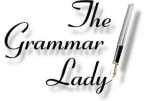Reading
better
Education no doubt can be suggested in the
classroom; but education happens in the library.
~~ From Prof. John V. Fleming's article, "Libraries, the
Princeton campus's unknown repository of sexiness"
|
Truly excellent writing cannot be mastered by memorizing lists of
rules.
It is the result of understanding the richness of the language and the
nuances of expression. This is gained through reading well-written
prose.
Unfortunately, many magazines, most newspapers, and most college
textbooks
are not good models for formal writing.
Make time to read a variety of good, well-written books. It is not
expensive:
visit your local library. If a busy schedule prevents you from reading
the classics, subscribe to a good magazine, such as Smithsonian,
Harper's,
or Atlantic Monthly.
As "Dear Abby" has written, "Those who do not
read are no better off than those who cannot read."
In order to free up some time for reading (and other forms of
personal
enjoyment and development), consider killing
your television. (Or at least disabling it sometimes.)
Words can be fun! The more one knows about words, the better one's
writing
and speaking will be. A series of "reforms" in public education -
combined
with the numbing effect of television - have resulted in a generation
of
young people who know half as many words as their grandparents did.
Recovery
can be fun, though. Scrabble, crossword puzzles, and the newspaper
jumble
are good places to start.
The web site Wordsmith.Org
provides several ways to have fun with words, including a daily
vocabulary
e-mail and a highly addictive anagram server. Playing with anagrams
builds
critical thinking and vocabulary. Some fun examples from the site:
-
Dormitory = Dirty Room
-
Clint Eastwood = Old West Action
-
Mr. Mojo risin' = Jim Morrison
-
Tom Cruise = So I'm Cuter
-
Spiro Agnew = Grow a Spine (or another body part)
-
James Hayes-Bohanan = Shaman has Banjo Eye
Visit the page and anagram your own name!
Listening to your writing
|
Once you have written an essay, read it aloud. Read it to a mirror, to
a house mate, or to your pet. This will expose certain awkward
constructions
that you might miss when reading silently. Better yet, have somebody
else
read the work aloud to you, because as the writer you might read what
you
intended to write, rather than what you actually wrote.
This method only works to the extent that your ear is "tuned" to
good
writing. Keep in mind that what is acceptable in spoken English is not
necessarily good written form.
Consider these tips for building your vocabulary, courtesy of the
Scripps
Howard News Service:
-
Keep a pocket dictionary with you at all times (at least while you are
studying).
-
Keep a highlighter with you at all times (at least while you are
studying).
-
Read everything you can get your hands on.
-
Highlight every word you do not understand. At the end of every half
hour,
stop reading and start looking up the highlighted words in your
dictionary.
When writing, always choose the simple word you are sure you know over
the fancy word you think you know, or check a dictionary carefully to
be
sure you are using the word properly.
If you are using a word processor, learn how
to
use it to its fullest advantage. A
word processor is not a glorified typewriter; modern programs include a
variety of features that can actually help you improve your writing.
These
include outlining (see above), grammar checking, and tools to assess
the
grade level (complexity) of your writing style. Formatting features
such
as single- versus double-spacing, bullet lists, headings, and
pagination
can make your work easier to read and more professional-looking.
Word processing programs allow the user to format titles properly
(italics,
not underlining), to present chemical notation properly (CO2,
not CO2), and to present exponents properly (km2, not km2).
Most word processors include on-line help and tutorials. Information
services at Bridgewater provides students with free training in
Microsoft
Word.
Please double-space your papers, even if you write them by hand. This
gives
whoever is reading the paper an opportunity to make corrections or
suggestions.
Extended quotes, bullet lists, and bibliographies should be
single-spaced.
The Writing
Handbook is an online resource provided by the Writing Center at
the
University of Wisconsin. It provides detailed guidance on the use of
several
of the major style formats, including APA, MLA, and Chicago. I am
currently
looking for online resources for the special format used by AAG.
Meanwhile,
I encourage my students to use any style, as long as it is used
consistently.
Of the styles listed in the Writing Handbook, the APA style is closest
to AAG.
 |
Dr. Mary Bruder,
who writes
a newspaper column about good grammar, also maintains a web site. I
especially
recommend her "tips" page, which lists pairs of commonly confused
words,
such as adverse and averse, prostate and prostrate,
and many others. |
Grammar Hotline. You can call 1-800-279-9708 (Mon.- Fri..
9:00
a.m. - 5:00 p.m. Eastern Daylight Time) to ask questions about grammar.
To check the usage of a specific word or phrase, see Paul Brians' Common
Errors in English page.
Return to my Not-the-13th-Grade page.
Any questions? Contact me at jhayesboh@bridgew.edu.
James Hayes-Bohanan, Ph.D.
Bridgewater State College
Revised: January 20,
2005
